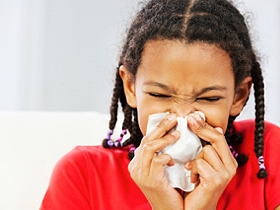Article at a Glance
- Reduce allergy symptoms by trying to stay indoors and keeping pollen out of your home.
- A runny nose, itchy eyes, dark circles under the eyes, and sneezing lasting more than 10 days are all symptoms of a possible allergy.
- If you think your child might have seasonal allergies, keeping an allergy log can help your pediatrician diagnose any problems.
Utah usually experiences three different pollen seasons. In the spring we get tree pollen, in the summer it is grass and weed pollen, and in the late summer and fall it is ragweed. For those with allergies it can almost make you wish for the snow to show up again!
But by following these simple tips when your allergies are at their worst, you can hopefully get a little relief.
- Try to stay in doors as much as possible, especially on windy days. If you do go outside, change your clothes, wash them right away, and if possible take a shower. This will help keep the pollen out of your house.
- Keep the windows closed and turn on the air conditioner. Make sure you change out the filter monthly.
- Cut your lawn short and don’t let it go to seed.
- Take a shower every night and change your bedding often.
- If needed, try over-the-counter antihistamines. Make sure that they are age appropriate for your child by consulting with your pediatrician.
- If your symptoms are severe, you may consider allergy shots. Taken over a period of 3 to 5 years, the shots help reprogram a person’s immune system.
If your child seems to constantly have a cold during this time of year, you might want to make sure it isn’t seasonal allergies. Here are some things to look for.
- A stuffy or runny nose
- Sneezing
- Itchy nose and itchy or watery eyes
- Dark circles under the eyes
- Allergic salute – children using the palm of their hand to push up their nose as they try to stop the itching
- Coughing caused by clear mucus running down the back of the throat
- Symptoms lasting for more than 10 days
When trying to diagnose an allergy, it is helpful to keep a log to see when your child is suffering from symptoms. If you think your child does have an allergy, be sure to see your pediatrician. Your pediatrician can run some tests to see if any of the most common allergies are a problem.
You May Also Be Interested In:
The 411 On Allergies
Does My Child Have an Allergy?
Dealing With Asthma Flare Ups
Hay Fever
Share this article:
